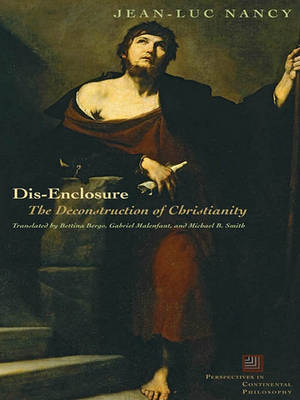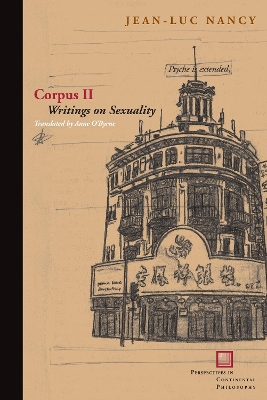Perspectives in Continental Philosophy
4 total works
Dis-Enclosure: The Deconstruction of Christianity
by Distinguished Professor of Philosophy Jean-Luc Nancy and Gabriel Malenfant
How have we thought "the body"? How can we think it anew? The body of mortal creatures, the body politic, the body of letters and of laws, the "mystical body of Christ"-all these (and others) are incorporated in the word Corpus, the title and topic of Jean-Luc Nancy's masterwork.
Corpus is a work of literary force at once phenomenological, sociological, theological, and philosophical in its multiple orientations and approaches. In thirty-six brief sections, Nancy offers us at once an encyclopedia and a polemical program-reviewing classical takes on the "corpus" from Plato, Aristotle, and Saint Paul to Descartes, Hegel, Husserl, and Freud, while demonstrating that the mutations (technological, biological, and political) of our own culture have given rise to the need for a new understanding of the body. He not only tells the story of this cultural change but also explores the promise and responsibilities that such a new understanding entails.
The long-awaited English translation is a bold, bravura rendering. To the title essay are added five closely related recent pieces-including a commentary by Antonia Birnbaum-dedicated in large part to the legacy of the "mind-body problem" formulated by Descartes and the challenge it poses to rethinking the ancient problems of the corpus. The last and most poignant of these essays is "The Intruder," Nancy's philosophical meditation on his heart transplant. The book also serves as the opening move in Nancy's larger project called "The deconstruction of Christianity."
This book is a profound and eagerly anticipated investigation into what is left of a monotheistic religious spirit-notably, a minimalist faith that is neither confessional nor credulous. Articulating this faith as works and as an objectless hope, Nancy deconstructs Christianity in search of the historical and reflective conditions that provided its initial energy. Working through Blanchot and Nietzsche, re-reading Heidegger and Derrida, Nancy turns to the Epistle of Saint James rather than those of Saint Paul, discerning in it the primitive essence of Christianity as hope.
The "religion that provided the exit from religion," as he terms Christianity, consists in the announcement of an end. It is the announcement that counts, however, rather than any finality. In this announcement there is a proximity to others and to what was once called parousia. But parousia is no longer presence; it is no longer the return of the Messiah. Rather, it is what is near us and does not cease to open and to close, a presence deferred yet imminent.
In a demystified age where we are left with a vision of a self-enclosed world-in which humans are no longer mortals facing an immortal being, but entities whose lives are accompanied by the time of their own decline-parousia stands as a question. Can we venture the risk of a decentered perspective, such that the meaning of the world can be found both inside and outside, within and without our so-immanent world?
The deconstruction of Christianity that Nancy proposes is neither a game nor a strategy. It is an invitation to imagine a strange faith that enacts the inadequation of life to itself. Our lives overflow the self-contained boundaries of their biological and sociological interpretations. Out of this excess, wells up a fragile, overlooked meaning that is beyond both confessionalism and humanism.
In this outstanding new collection, philosopher Jean-Luc Nancy takes up his perennial themes—community, embodiment, being-with, literature, politics, sense, and meaning—as part of a deep and mature appreciation of the fact that we are richly, joyfully, and thoroughly sexual beings.
In a concise but extremely important essay, “The ‘There Is’ of the Sexual Relation,” Nancy responds to Lacan’s dictum that “there is no sexual relation” and makes a radical argument for the central place of the sexual relation as our originary mode of being with one another. “The Birth of Breasts” is a beautiful reflection on human anatomy and the image and reality of the breast that draws on literature and poetry from Sappho to Beckett.
In “Strange Foreign Bodies,” Nancy revisits the philosophical territory of the relation between mind or spirit and body but reminds us that bodies are at once familiar to us and also irredeemably strange. “The Body of Pleasure” explores the body as the site of essentially finite pleasure, “finite because it reaches the end, the limit where the body tends to lose all form, becomes matter, an impenetrable mass. But this end also forms the touch of the outside and with it the joy of the world.”
Finally, “The Sexual Relation—and Then” builds on the insight into the central place of the sexual relation by considering specifically the generative possibilities of sex and the fact that we all came to be as the product of sexual relations.
Nancy’s Corpus, published in English in 2008, was the philosopher’s most sustained consideration of embodiment to date. Now, in Corpus II, he carries that work in new directions which constantly remind us that human bodies are sexed and sexual bodies.


